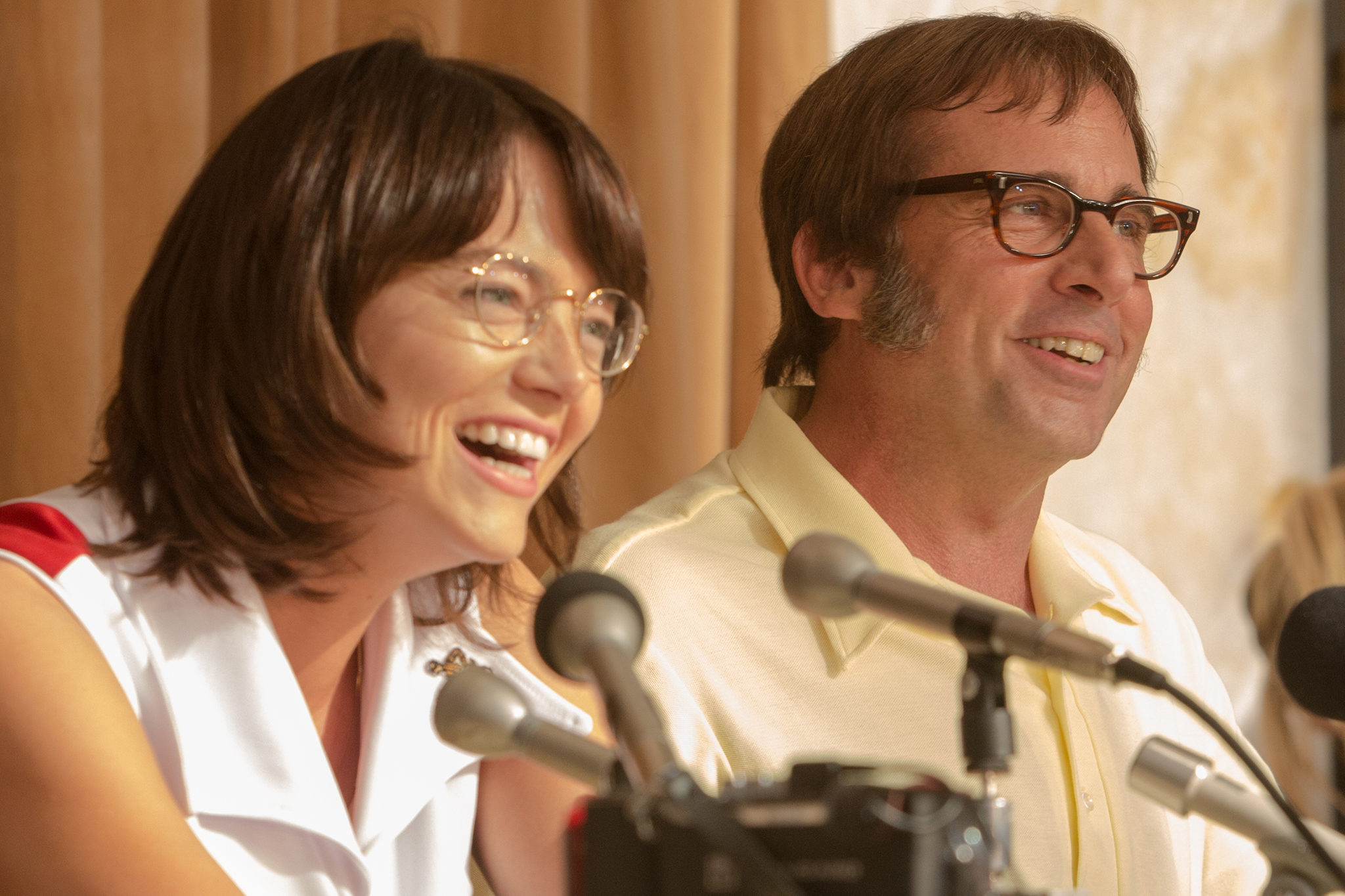The ad campaign is selling Battle of the Sexes as a high comedy, but it’s also a complex behind-the-scenes relationship drama as much about tennis legend Billie Jean King’s hidden identity politics as the overt social ones driving the plot.
Directed by Valerie Faris and Jonathan Dayton (Little Miss Sunshine, Ruby Sparks) with a screenplay by Simon Beaufoy (Slumdog Millionaire), the picture recreates, in highly entertaining fashion, the circus-like 1973 tennis match between has-been, self-avowed “male chauvinist” Bobby Riggs (Steve Carell) and famed Bille Jean King (Emma Stone), a public event that was, at least as recreated here, a significant moment in American culture and a big step forward for women’s “lib.”
But the movie isn’t about tennis, per se, but rather the off court dramas driving both Riggs and King, and it’s here that the movie is most substantive, particularly with King’s story of being married to a very nice guy (Austin Stowell) and having to face the fact that she’s a lesbian after meeting a pretty hairdresser (Andrea Riseborough) who becomes the women’s team’s personal stylist.
What the movie does, and well, is point out pervasive sexism of the time where men weren’t afraid to acknowledge their preference that women stay “in the kitchen or the bedroom,” and those in a position of power (notably tennis association honcho Jack Kramer, played by an effective Bill Pullman) in professional tennis dismissed any notion that women could achieve parity with men. There’s a lot of fun to be had here, including archival footage of Howard Cosell opining on how King could be a Hollywood star if she’d just let her hair grow and lose her glasses.
The screenplay is rich in its depiction of King’s responsibilities and how she manages them—to be faithful to a husband, kind to a new lover, an emblem to American women and the cause of equality, a titan of her sport. How she balances each of these, up to and including a moment of naked relief near the picture’s end, is what makes Battle of the Sexes ultimately so gratifying.
And Riggs, when not making the rounds on late-night television, mounting absurd publicity stunts or racking up corporate sponsors, contends with his well-heeled wife, played with focus by Elisabeth Shue, whose increasing impatience with his habitual gambling and media antics reaches a breaking point in a dramatic scene where Carell, in close-up, is forced to face the music of his broken marriage.
The second half of the picture forges a path to the climactic match, largely shot with doubles standing in for the stars, effective because we’ve come to understand both of these characters and what’s driving them and why it’s important for each to win. For Riggs, the notion that he might escape from the 9-5 doldrums of working for his father-in-law’s company and earn his wife’s respect, isn’t quite given as much weight as King’s personal dynamics, but Carell effective captures Bobby’s drive for personal redemption.
Stone, the most direct and perhaps endearing of young American actresses, for the first time displays the ability to sink into a character’s skin—quite a challenge given all we know about King—nearly making us forget we are watching Emma Stone beneath the glasses, wig and high-stress stakes.
Riseborough, so good in 2013’s Disconnect, is note-perfect as the kind hairdresser who awakens the tennis star at a critical personal and professional moment. Stone conveys this confusion with intense concentration rather than easy emotion. Their developing relationship and its implications on King’s craft and marriage raise the stakes in this most entertaining time capsule of a commercial movie.
Also along for the ride is a whip-smart Sarah Silverman as the women’s team manager and Alan Cumming as the team’s personal designer, a flamboyant turn offering a moment of wisdom near the end, one too on-the-nose for such a savvy picture.
3 1/2 stars.



